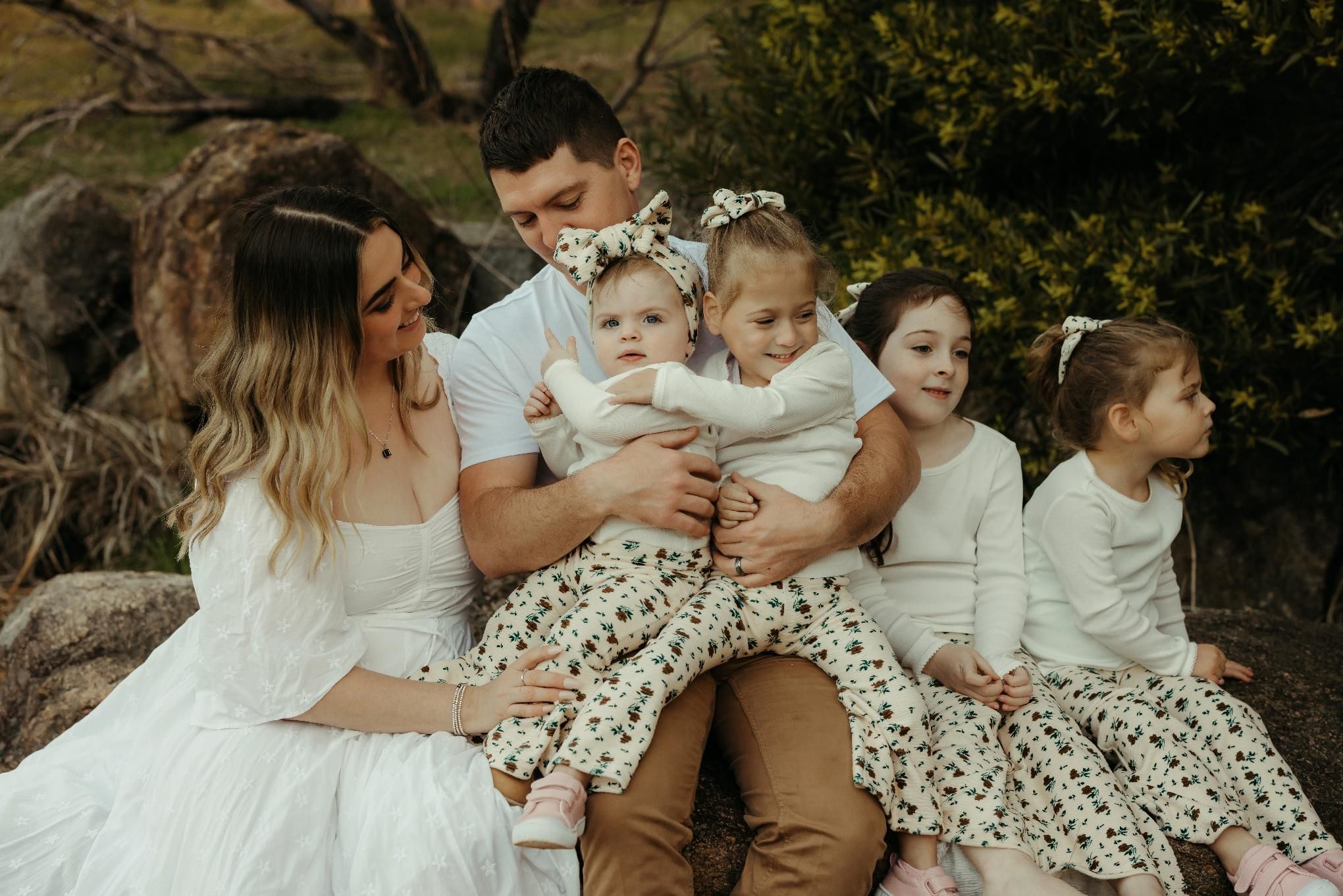
Parent Carer Collective: Grecian Martin
by Hibi
Feb 12, 2024
She doesn’t sugarcoat the challenges that can come with being a parent carer – and a mother of four, to boot – but this Australian content creator and marketer wouldn’t have it any other way.
“And though she be little, she is fierce.” Shakespeare’s line is how Grecian Martin sums up her six-year-old daughter, Riley, who was born prematurely alongside her sister, Hanna. These twin girls spent the first five months of their lives in the neonatal intensive care unit (NICU) before heading home and setting off on drastically different paths.
While Hanna developed in typical fashion, Riley’s progress was impacted by what would become a lengthy list of diagnoses, including cerebral palsy and autism. She’s since kept her parents Grecian and Justin – who live in Perth, Western Australia – very busy with her various medical appointments and significant support needs.
Life can be hard, as Grecian says. But this loving family – which also includes eight-year-old Adelyn and Maisee, who’s two – has found its stride.
Grecian shares much of their shenanigans on Instagram, where she’s become increasingly influential. Whenever she can swing it, she’s tucking into a Colleen Hoover or Fourth Wing novel. Viewing-wise, she’s got Dexter on repeat.
Here’s what Grecian had to say on caregiving, career pivots and mastering the juggle.
When we are expecting a child, we usually expect to be their parent, not their ‘carer’. Do you identify as a ‘carer’ to Riley?
One hundred percent I feel like a carer and not just a mum. I never thought I would be changing my daughter’s nappies at six years old, giving medication and feeds through a PEG as well as buying more ‘baby’ toys for her. It probably hit me once the gap between Hanna and Riley became greater – and still grows as they do.
What were your biggest struggles in the early months and years of parenting Riley, and what helped you during this time?
In the early months, the biggest struggle was when, after five months, she finally came home from NICU. Riley came home on oral thickened feeds and medication, as well as 24/7 oxygen. That first year was the hardest time as we had no idea what was going on and what was in store for our miracle girl.
We isolated ourselves a LOT during the first few years due to the girls’ low immunity, especially for Riley. We were in and out of hospital only two weeks after she came home due to sickness, so doing this all by ourselves was tough. Having a strong relationship between Justin and I was the most important thing during this time.
How did you start forming connections with other parents raising kids with disabilities, and what changed for you once you started forming these connections?
I started sharing our journey more on social media once both girls were home from NICU. I’d leant on others via social media during our time in NICU, and I wanted to repay the favour in case someone else needed a shoulder to lean on in their own journey.
Slowly my Instagram following grew and other medical parents reached out saying thank you for sharing, as now they didn’t feel so alone in their journey. It makes my heart so happy helping others through their own journey.
Nowadays, what does caring for Riley tend to look like?
Riley relies on us a lot for the majority of her everyday activities. Having cerebral palsy, she struggles with strength. We do all her dressing, showering and nappy changing. She has 85 percent of her nutrition and 100 percent of liquids through her PEG. We are constantly watching her for her own safety and for seizures.
As she grows, the gap between what a six-year-old should be able to do and what Riley can do increases. I find this tough sometimes to accept, deep down, as we have that direct comparison to her twin, Hanna.
Can you compare your initial thoughts and feelings around parenting and caring for a child with disability to how you feel now?
To start with we were a bit oblivious to how things may end up. We were initially told she was clear of cerebral palsy and her brain damage from birth was minimal. Over the years we have come to see Riley has slipped through the cracks of the hospital system a lot – and I mean A LOT – and each year her list of diagnoses increases.
I was shit-scared after her first diagnosis. Riley has three siblings, so I was very worried about the juggle of everything plus making time for my other girls. Nowadays, we just go with the flow. We know the juggle a bit better, try to take things in our stride and get on with it. It’s still hard, though.
What do you find most challenging about being a parent carer? And on the flipside, what brings you the most joy?
The most challenging thing is seeing Riley with her peers and how ‘behind’ she is – sometimes that hurts my heart a lot. On the flipside, she is the most resilient and strong girl I’ve ever met. She continues to amaze me daily and her smile is just so cheeky. I wouldn’t have it any other way.
‘Self-care’ is a bit of a dirty word in the parent-carer space, as we’re often told to do it and rarely have the opportunity. If you do manage to get an hour or so to yourself, just for you (not chores!), what do you do?
A lot of my self-care is taken in moments throughout the day, even with the kids around. I try to walk on my treadmill, get a 15 minute workout in, go to the shops, watch a trashy tv show, journal with a hot lemon water, or read in the sunshine.
Many parent carers need to step out of their careers to meet their child’s needs. How has your working life changed, if at all, since becoming a parent – and how do you feel about these changes?
Oh yes! This one is a toughie. Ever since having the twins my work schedule has definitely changed. I had to drop from part-time to casual to work around our busy life. I love working and having something just for me to focus on – away from being a mum and a carer – so when I had to quit my job last year, I fell into a dark place mentally.
This year my focus has changed direction with an amazing online network marketing brand and I’ve found my passion and purpose again, as I can juggle it around the kids and medical life.
What supports have you put around yourself – or do you hope to put around yourself – so you can be your best version of yourself for the kids?
Our three new support workers have been a godsend! These ladies in our team go above and beyond for our family, Riley and me. Having them has allowed me to relax a little more and focus on my mental health, mindset and physical health so I can be the best version of myself.
How has your relationship with Justin changed since you became parents? And how do you two juggle your carer/parent roles between the kids?
Our relationship has definitely grown, adapted and become stronger since having children. We have not had an easy ride into parenthood – with infertility, IVF, micro-premmie twins and a child with disabilities – but we have stuck together and been on the same page during our journey.
When I was working, I would work around Justin’s shifts and he would be at home with the kids, and vice versa. I am very blessed that he is very hands on with caring for Riley and has always put his hand up for appointments and hospital stays when he can.
Is there anything you’d like to share about Riley's relationship with her sisters, too?
Riley is super close to her twin, Hanna, which is expected! It’s like a love-hate relationship, though. One minute they fight – and Riley may bite Hanna – but then the next minute they are happily playing Bluey together.
Riley’s relationship with her younger sister, Maisee, is an interesting one as her physical skills and development, to some degree, are closer to Maisee than Hanna. This leads them to fight over the same ‘younger’ toys a lot! But then Maisee loves helping with Riley’s meds and feeds.
Big sister Adelyn is very understanding and caring about Riley’s disabilities and loves to look after her.
Looking to the future, what are your hopes and dreams around how Riley is cared for and your role in her care?
I want Riley to be cared for and looked after to the best of our ability as she grows. I have no idea how or what this care will look like, but we will take it in our stride, no matter what life throws at her.
What do you wish other people knew about life as a parent carer?
That it’s not easy at all! We never know what the day will bring and the unknown is hard to accept. I want people to know that we aren’t ‘strong’ or dealt these cards because we are amazing – we do the best we can in each and every moment and we would do anything for our children. Our brains never turn off and there is always something to do, or an appointment to make or a therapist to email. It’s a never ending list.
I wish people weren’t afraid of our Riley bear. Yes, she may have seizures and be PEG fed, but we can teach you how to support her. Lots of people – including family members – tend to turn a blind eye towards her and us because of her disabilities, and that does hurt.
What advice do you have for parents who are new to caring for a child with disability?
Lean on others who’ve been in similar scenarios to you. Reach out on social media or other platforms for guidance. You are never alone in your journey. You do not always have to put on a brave face. Being a medical parent is a rollercoaster and it’s okay to have those highs and lows.
What books/podcasts/TV shows/films/resources have you found relatable, inspiring and/or helpful as a parent carer?
Special by Melanie Dimmitt
My very own podcast, that I host with another medical mum, RAWR The Podcast
The Facebook page Mighty Mums
You can follow Grecian’s story on Instagram.
Let’s clear out the complexities of care. Try Hibi for free here.
Want to share your parent-carer story? We’d love to hear it. Get in touch with our team at hello@hibi.health





